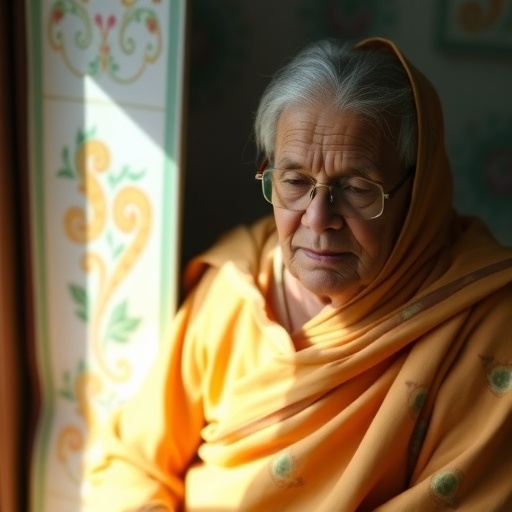As Bangladesh experiences a significant demographic transformation, the mental health of its aging population has become a vital concern. Recent research conducted across various regions of the country offers an illuminating look into the pervasive mental health challenges confronting the elderly. The study, published in the esteemed journal BMC Psychiatry, meticulously quantifies the prevalence of depression, anxiety, insomnia, and loneliness among Bangladesh’s geriatric population, unraveling the complex social and lifestyle factors that exacerbate these conditions.
With a sample size of over 1,500 older adults, the study employs rigorous face-to-face cross-sectional surveys, ensuring high-quality data collection through stratified random sampling. Utilizing internationally recognized assessment tools such as the PHQ-9 for depression, GAD-7 for anxiety, AIS-8 for insomnia, and UCLA-3 for loneliness, the researchers provided a comprehensive analysis of mental health symptoms within this vulnerable demographic. The scale and depth of this investigation mark a significant contribution to understanding geriatric mental health in low-to-middle-income countries, where such large-scale studies are scarce.
The findings are sobering: depression afflicts nearly six in ten older adults, with 58% showing symptoms ranging from mild to severe. Even more striking is the prevalence of anxiety, affecting an overwhelming 82% of participants. Insomnia symptoms were present in 77%, indicating widespread sleep disturbances in this age group. Loneliness, often an overlooked facet of mental health, was reported by 9% of respondents, underscoring the social isolation challenges that accompany aging, especially in developing nations facing rapid demographic shifts.
The study delves deeper into the demographic and socio-economic variables influencing these mental health disorders, revealing a nuanced pattern of vulnerability. Women, those who have experienced spousal loss or separation, individuals out of the workforce due to retirement or unemployment, and people living with modest economic resources were markedly more susceptible. These factors illuminate how social displacement and economic insecurity exacerbate psychological distress, highlighting the intertwining of mental health with broader social determinants.
Lifestyle choices and conditions also surface as critical contributors. Smoking habits, irregular or absent physical activity, and the need for assistance in daily tasks significantly correlated with heightened risk of depression and anxiety. Moreover, the paradoxical finding that involvement in social activities correlates with certain mental health symptoms invites further investigation into the quality and context of social participation among older adults.
Physiological factors are not left unexamined; chronic diseases and ongoing health conditions were consistently linked to worse mental health outcomes. This intersection points to the bidirectional relationship between physical and mental health, suggesting integrated healthcare approaches may offer the most effective path forward for geriatric care in Bangladesh.
Statistical analyses further elucidated the co-occurrence of these conditions, with many participants experiencing overlapping symptoms of depression, anxiety, and insomnia. This clustering hints at shared pathophysiological mechanisms or compounded effects of social and health determinants, reinforcing the need for holistic diagnostic and therapeutic strategies that address multiple mental health domains simultaneously.
The implications of these findings extend beyond clinical frameworks, posing significant policy challenges. The high prevalence of mental health symptoms emphasises an urgent need for community-focused mental health services tailored to the socio-cultural realities of Bangladesh. Interventions that are locally and culturally adapted will be crucial in addressing stigma, improving accessibility, and delivering effective care to this growing population segment.
Interestingly, the study highlights structural factors, such as family living arrangements, as significant moderators of mental health conditions. Older adults living without family support were at greater risk, spotlighting the enduring importance of social structures in mental well-being and suggesting that policies promoting family-based or community support systems could yield substantial benefits.
In sum, this landmark study provides a robust, data-driven foundation for understanding the complex landscape of geriatric mental health in Bangladesh. The confluence of demographic changes, socio-economic vulnerabilities, lifestyle factors, and chronic health issues creates a multifaceted challenge that demands coordinated action from health professionals, policymakers, and community leaders alike.
By capturing the intricate web of influences on mental health among older adults, this research offers a roadmap for targeted interventions that can alleviate suffering and enhance quality of life. The interrelation of mental health symptoms observed also calls for comprehensive screening and treatment approaches, integrated into primary healthcare services to ensure early detection and management.
As Bangladesh continues its demographic transition, these findings act as a clarion call to prioritize geriatric mental health within national health agendas. Investing in culturally sensitive, accessible mental health services tailored to older adults is not merely a healthcare imperative but a societal responsibility to ensure dignity and well-being in later life.
The research represents a pivotal advancement in geriatric psychiatry, especially within a developing country context, and sets the stage for future longitudinal studies and intervention trials. As the global population ages, the insights gleaned from Bangladesh’s experience hold relevance for other nations navigating similar challenges, underscoring the universal importance of addressing mental health in aging populations.
Subject of Research: Mental health prevalence and associated risk factors among the elderly population in Bangladesh
Article Title: Prevalence and associated risk factors for depression, anxiety, insomnia, and loneliness among the geriatric population in Bangladesh: a cross-sectional study
Article References:
Rahman, M., Khan, M., Fattah, T. et al. Prevalence and associated risk factors for depression, anxiety, insomnia, and loneliness among the geriatric population in Bangladesh: a cross-sectional study. BMC Psychiatry 25, 1102 (2025). https://doi.org/10.1186/s12888-025-07500-0
Image Credits: AI Generated
DOI: 10.1186/s12888-025-07500-0 (Published 18 November 2025)




